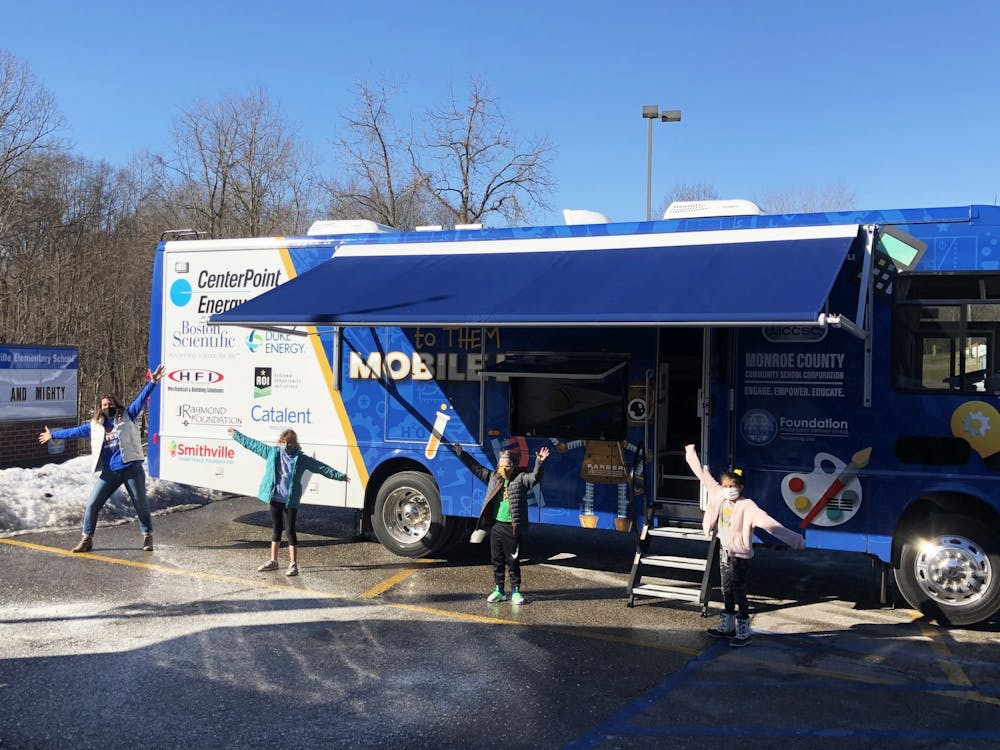Monroe County Community School Corporation’s new mobile classroom has color-coded lab stations, whiteboard cabinets, three TV monitors and robots.
The STEM to THEM mobile lab, an RV designed by MCCSC employees providing technological and scientific resources for K-6 students, was unveiled at a ribbon cutting ceremony Feb. 22. While the name of the program uses the acronym STEM, the bus will provide resources for students to learn about subjects in STEAM — science, technology, engineering, arts and mathematics.
Katy Sparks, MCCSC district-wide STEM and computer science coach, said this mobile classroom will allow for more equity between the schools regarding their access to technology and lesson plans.
“We know that there are underrepresented groups in STEM, specifically students of color, female students,” she said. “It is really important for us that no matter where you live, no matter what school you attend, you are getting these same opportunities in STEM and computer science.”
The Foundation of Monroe County Community Schools raised and spent about $375,000 for the vehicle and robotics and maker labs, said FMCCS executive director Cyrilla Helm.
Debra Prenkert, MCCSC director of elementary education, said the mobile classroom will travel to each MCCSC elementary school twice a school year for about one week, depending on the size of the school. During the first visit, which will take place in the fall semester, students will complete a lesson on computer science and coding. For the second visit, in the spring semester, they will study engineering, she said.
“This way, all kids get to access these tools to be able to enhance their making, design, engineering, process and coding skills,” she said. “Each elementary school doesn’t have to try to come up with their own materials or buy their own 3D printer or their own laser printer.”
Groups of students will spend about 45 minutes on the bus and will also have pre-lab and post-lab lessons. The on-bus lesson will be taught by a teacher designated to the mobile classroom. The district has not yet hired for the position.
Students will complete lessons with different technology based on their grade level, Prenkert said. For the computer science lesson, grades K-2 will use Bee-Bots to learn algorithms and problem-solving, grades 3-4 will use Dash Robots to learn block-based coding and grades 5-6 will use Micro:bits to learn more advanced coding.
Sparks said these specific robots were chosen because they were durable, and the lessons learned from each robot will build on the other as the students progress through each grade level.
Prenkert said every decision made regarding the technology purchased and the bus’s design elements were made intentionally to create a specific and productive classroom. The bus selected for the mobile classroom was new when purchased so there could be a wheelchair lift. The cabinets are made of whiteboard material so students have space to write down their work.There is a TV monitor and an awning on the outside of the bus, so students can also learn outside.
The outside TV will possibly be used more in the fall semester depending on COVID-19 regulations, which could limit how many people can go into the mobile classroom at one time, Sparks said.
Donors for this project include Centerpoint Energy, Boston Scientific and Duke Energy.
The bus started visiting MCCSC elementary schools Feb. 25, and should stop by every school by spring break, Prenkert said. The bus has visited about half of the elementary schools as of Tuesday. All students at the elementary schools that have been visited saw the outside of the mobile classroom and, in some cases, were able to interact with some of the robots, Prenkert said.
The only students who can tour the inside of the mobile classroom are each school’s four finalists of the fourth grade maker challenge, which is a competition in which students use the engineering design process to develop creative solutions to a proposed community problem from a prompt.
Prenkert, who traveled with the bus to Binford Elementary School and Rogers Elementary School on Monday, said some students brought their iPads out to see the bus and asked if they could take photos to share with their parents.
“They are so enthusiastic and excited and can’t wait till it comes back to their school for a whole week,” she said.




